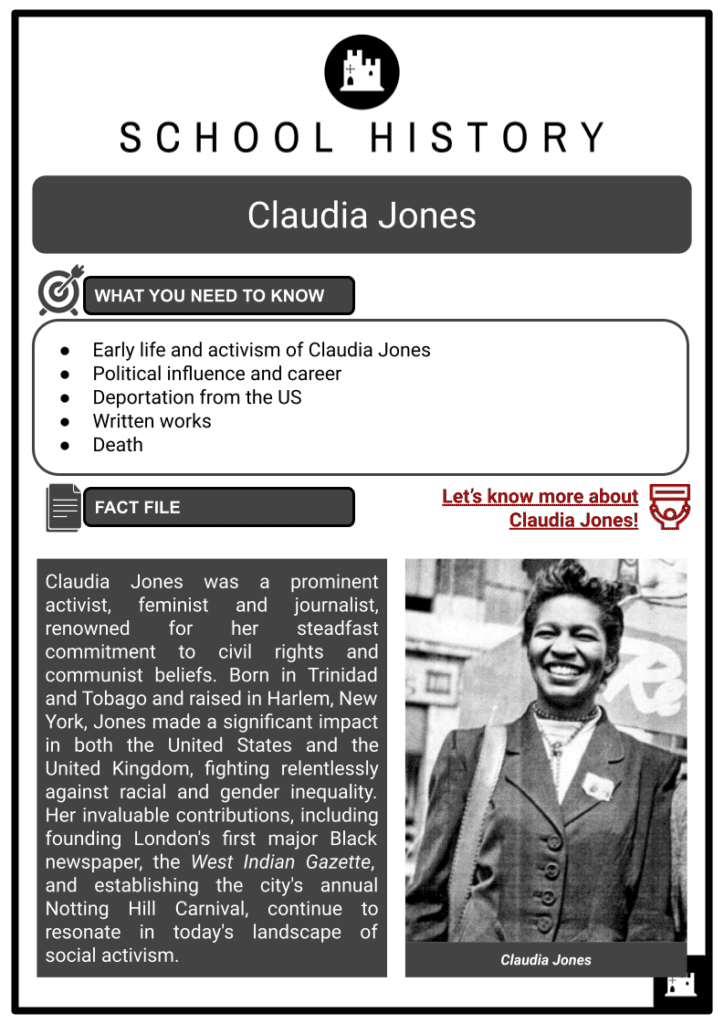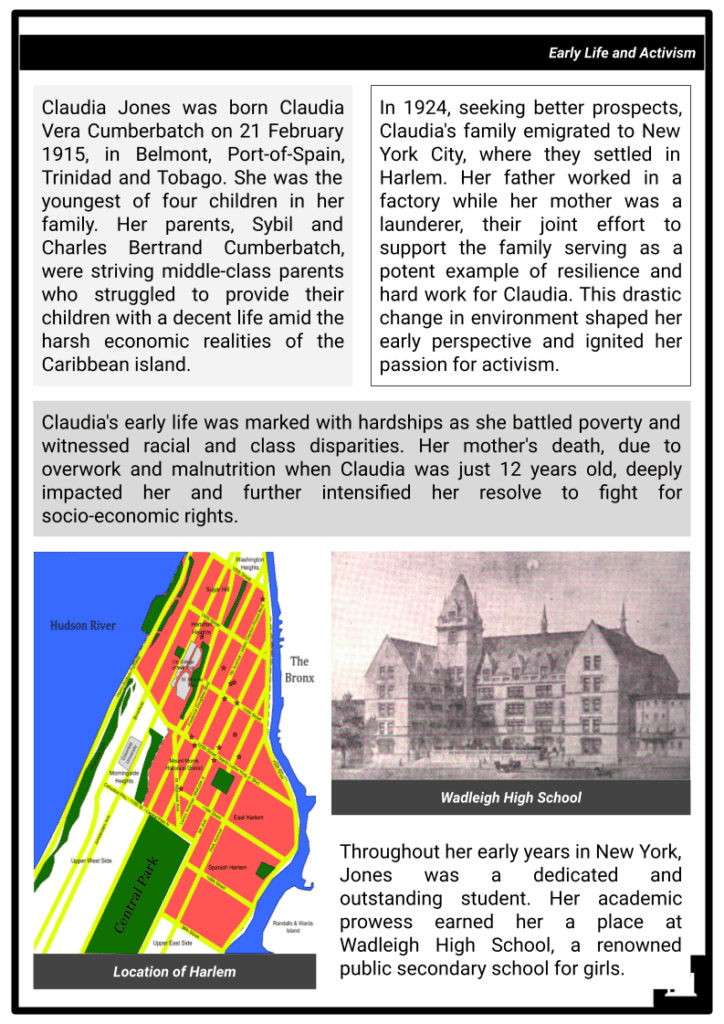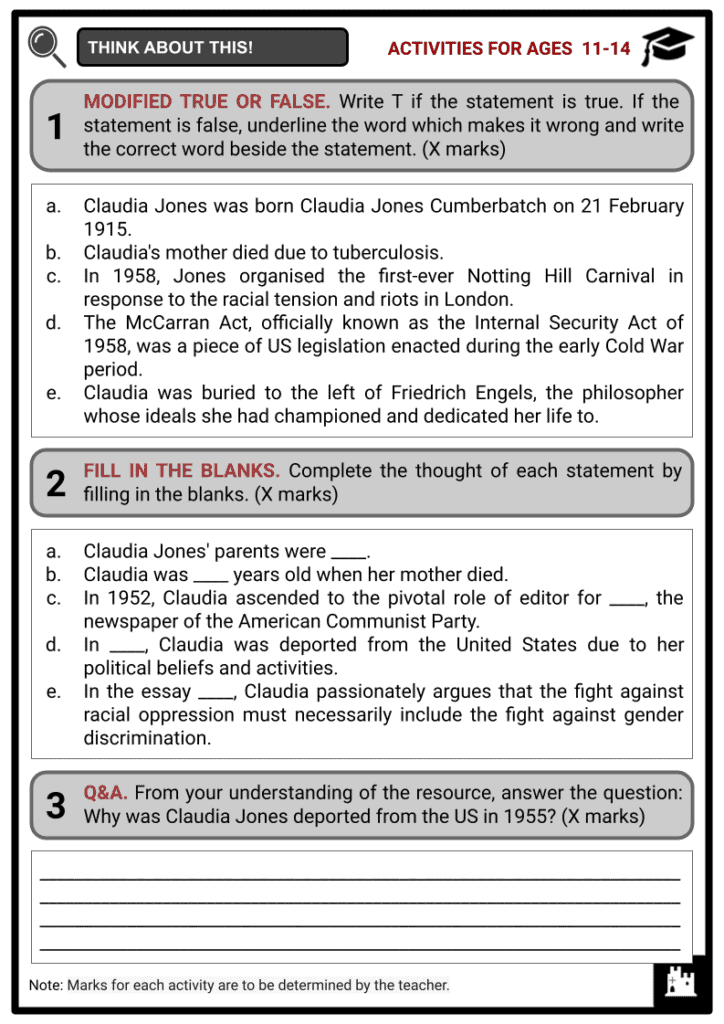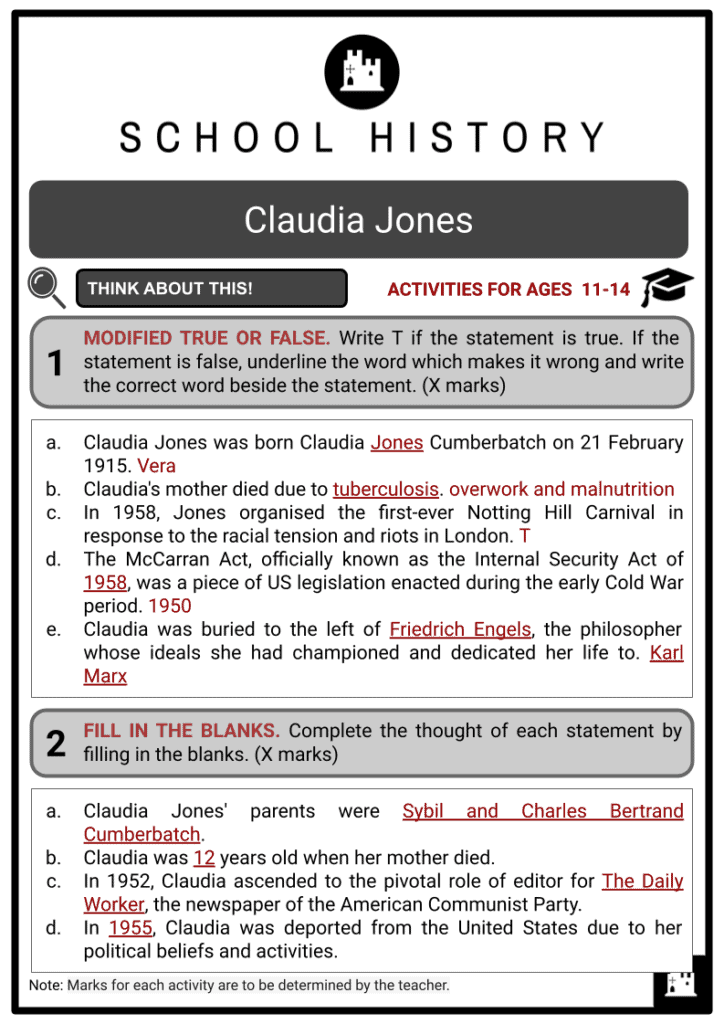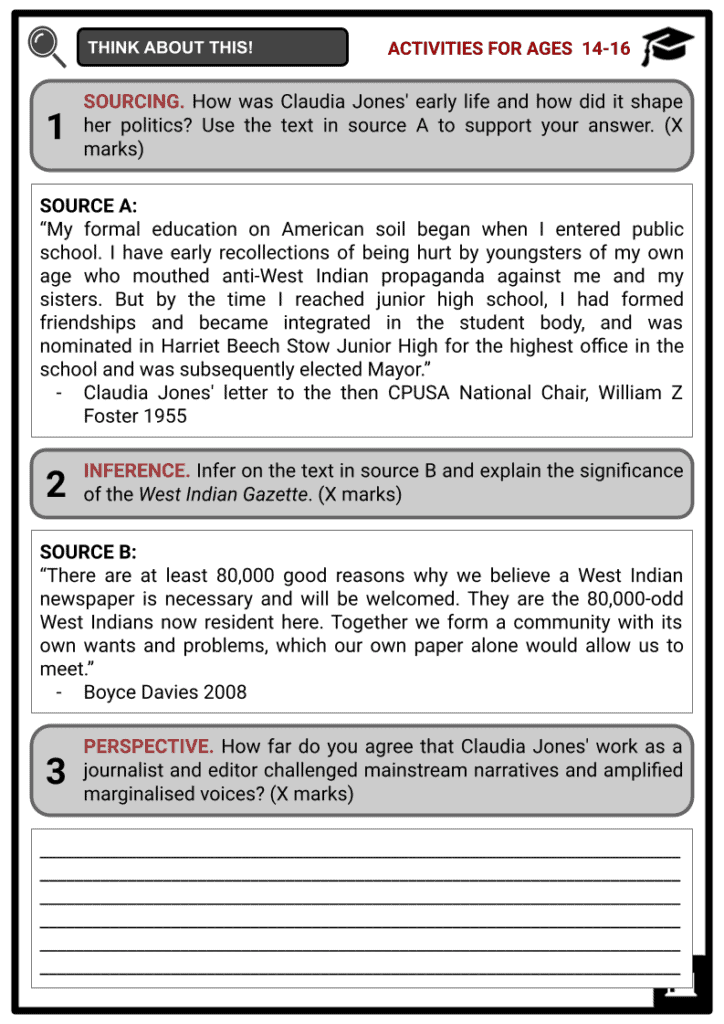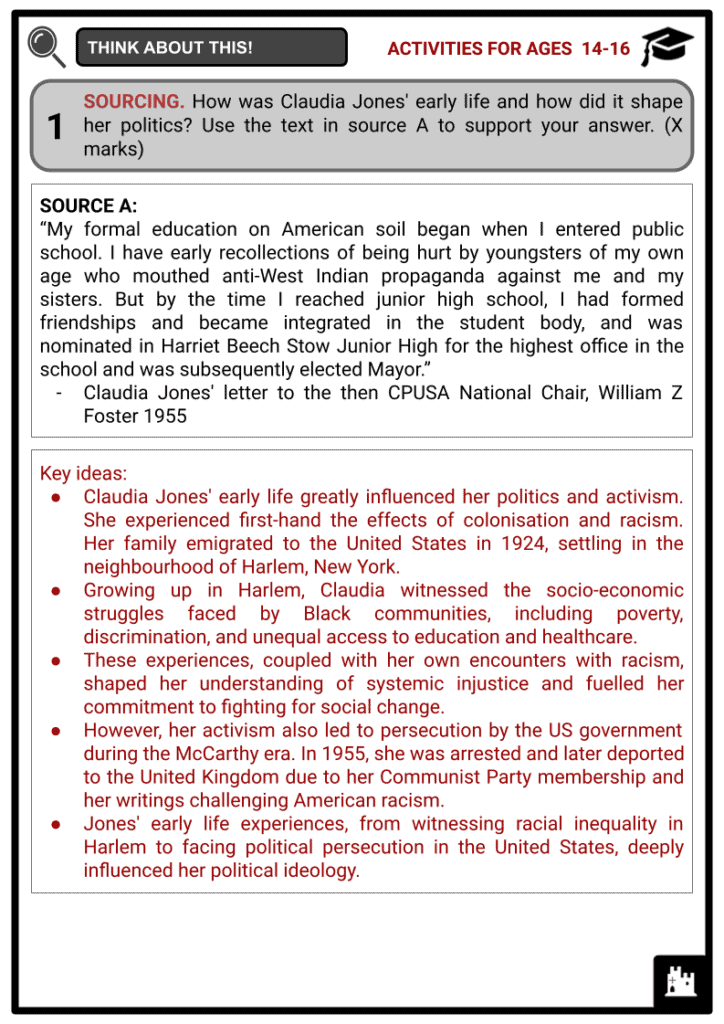Claudia Jones Worksheets
Do you want to save dozens of hours in time? Get your evenings and weekends back? Be able to teach about Claudia Jones to your students?
Our worksheet bundle includes a fact file and printable worksheets and student activities. Perfect for both the classroom and homeschooling!
Summary
- Early life and activism of Claudia Jones
- Political influence and career
- Deportation from the US
- Written works
- Death
Key Facts And Information
Let’s know more about Claudia Jones!
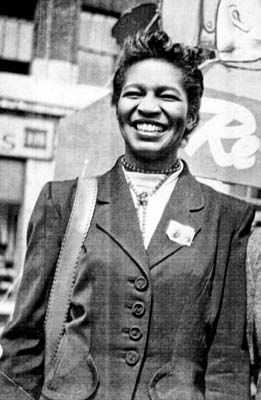
Claudia Jones was a prominent activist, feminist and journalist, renowned for her steadfast commitment to civil rights and communist beliefs. Born in Trinidad and Tobago and raised in Harlem, New York, Jones made a significant impact in both the United States and the United Kingdom, fighting relentlessly against racial and gender inequality. Her invaluable contributions, including founding London's first major Black newspaper, the West Indian Gazette, and establishing the city's annual Notting Hill Carnival, continue to resonate in today's landscape of social activism.
Early Life and Activism
- Claudia Jones was born Claudia Vera Cumberbatch on 21 February 1915, in Belmont, Port-of-Spain, Trinidad and Tobago. She was the youngest of four children in her family. Her parents, Sybil and Charles Bertrand Cumberbatch, were striving middle-class parents who struggled to provide their children with a decent life amid the harsh economic realities of the Caribbean island.
- In 1924, seeking better prospects, Claudia's family emigrated to New York City, where they settled in Harlem. Her father worked in a factory while her mother was a launderer, their joint effort to support the family serving as a potent example of resilience and hard work for Claudia. This drastic change in environment shaped her early perspective and ignited her passion for activism.
- Claudia's early life was marked with hardships as she battled poverty and witnessed racial and class disparities. Her mother's death, due to overwork and malnutrition when Claudia was just 12 years old, deeply impacted her and further intensified her resolve to fight for socio-economic rights.
- Throughout her early years in New York, Jones was a dedicated and outstanding student. Her academic prowess earned her a place at Wadleigh High School, a renowned public secondary school for girls.
- Unfortunately, due to her family's dire financial situation and her health problems, particularly tuberculosis, Claudia was unable to complete her formal education.
- Despite these setbacks, she remained intellectually curious and devoted to self-education. Claudia used the resources of the public library to fuel her passion for learning, immersing herself in literature, history and socio-political theories.
- As a teenager, Claudia became involved in the American Communist Party and started using her writing skills as a platform to voice her concerns, making her a prominent figure in early 20th-century activism.
- Claudia's encounter with the stark realities of racism and classism in America carved a path of activism for her. Her early life, marked by poverty and discrimination, fuelled her passion for equality.
Political Influence and Career
- Claudia Jones' political career took shape as she became more involved in activism. In 1948, she was appointed as the secretary of the Women's Commission of the Communist Party, where she worked tirelessly to fight for the rights of disenfranchised women.
- Claudia was a vocal critic of the capitalist systems, which she believed perpetuated racial and class disparities. Her political ideology was shaped by intersectionality, focusing on the unique experiences of Black women who were burdened by the compounding layers of racial, gender and class oppression.
- She was known for her powerful oratory skills and compelling writings. Her tireless efforts led to the recognition of these issues at a national level, contributing significantly to the broader struggle for civil rights.
- Claudia's tenure at the Women's Commission not only shaped her legacy as a pioneering female activist but also laid the groundwork for subsequent feminist movements.
- Her influence reached a zenith in the 1950s when she was one of the leading organisers of the West Indian Gazette (WIG), an Afro-Caribbean newspaper in London.
- At the Gazette, Jones dedicated herself to illuminating the often overlooked issues facing the Afro-Caribbean community within the UK. She believed in the power of journalism to enact social change and used the newspaper as a platform to challenge discriminatory practices and policies.
- Through the West Indian Gazette, Claudia left an indelible mark on the Afro-Caribbean community in the UK. Her tireless work in highlighting the unique struggles of this community led to increased visibility and understanding, paving the way for future progress and activism in this space.
- In 1952, Claudia Jones ascended to the pivotal role of editor for The Daily Worker, the newspaper of the American Communist Party. This was a significant turning point in her career, providing her with a broader platform to voice her views and concerns.
- She leveraged her editorial position to illuminate issues often overlooked in mainstream media – systemic racism, gender inequality and economic disparities. Her clear writing and insightful analysis connected with many, amplifying the visibility of struggles faced by marginalised communities, particularly Black women.
- In 1958, Jones organised the first-ever Notting Hill Carnival in response to the racial tension and riots in London. The carnival, which has since become one of the largest street festivals in the world, was a celebration of cultural diversity aimed at bringing about social integration.
- Throughout her political career, Jones leveraged her platforms to fight relentlessly for the rights of Black women and the working class, leaving an indelible mark on the history of civil rights movements.
Deportation
- In 1955, Claudia Jones was deported from the United States due to her political beliefs and activities, which were deemed subversive under the McCarran Act.
- The McCarran Act, officially known as the Internal Security Act of 1950, was a piece of US legislation enacted during the early Cold War period. Named after its sponsor, Senator Pat McCarran, the act sought to combat the perceived threat of communist subversion within the United States.
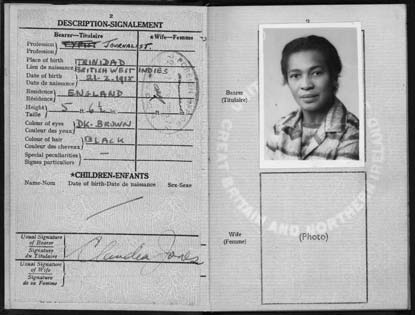
British passport of Claudia Jones - One of the primary provisions of the McCarran Act included the registration of Communist Party members and the prohibition of their employment in government positions. This piece of legislation also facilitated the deportation of certain non-citizens, like Claudia Jones, who were deemed threats to national security due to their political beliefs and affiliations.
- Claudia's deportation led her to Britain, where she quickly became an integral part of the Afro-Caribbean community. Despite the hardship of the deportation, Jones did not let this stop her from continuing her advocacy work.
- It was during this time in Britain that she founded the West Indian Gazette, endeavouring to provide a voice for the local Afro-Caribbean population. This period in Britain was a pivotal one for Jones, shaping her legacy as a champion for the rights of marginalised communities. Her deportation, while a personal setback, ultimately broadened the scope of her influence and cemented her place in history.
Written Works
- Claudia Jones was a prolific writer and activist, using her words to bring about necessary change. She penned a variety of works, from newspaper articles to essays and speeches, all aimed at highlighting the plight of marginalised communities.
- As the editor of The Daily Worker and later the founder of the West Indian Gazette, Claudia's writings served as a powerful tool advocating for racial and gender equality, labour rights and decolonisation.
- Her seminal essay, 'An End to the Neglect of the Problems of the Negro Woman!', is a testament to her focus on intersectionality, bringing to light the manifold challenges faced by Black women who were doubly oppressed by racism and sexism.
- In this essay, Claudia passionately argues that the fight against racial oppression must necessarily include the fight against gender discrimination. She advocates for an understanding of the unique set of challenges faced by Black women, who have been historically marginalised and silenced in society.
- The essay is a rallying cry, urging society to acknowledge and address the double burden of racism and sexism that Black women bear. The powerful narrative and Jones' lucid writing style underscore the urgency of this issue, making it a timeless piece that continues to resonate in our contemporary times.
- Claudia's writings weren't confined to the hardships – they also celebrated the strength, resilience and cultural richness of the Afro-Caribbean community. Her writings on the Notting Hill Carnival stand as an enduring symbol of her commitment to celebrating cultural diversity and fostering community solidarity.
- The carnival, which started under her guidance in response to racial tensions in the 1960s, was envisioned as a platform for the Afro-Caribbean community in London to express and celebrate their cultural heritage.
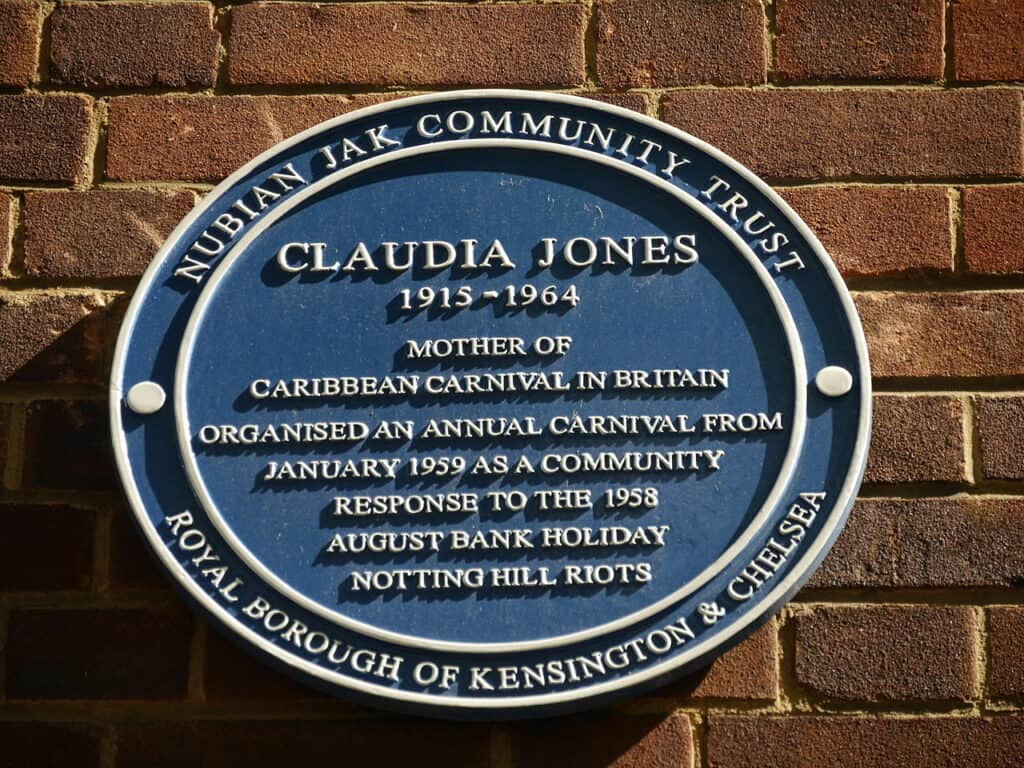
A blue plaque erected for Claudia Jones - Through her articles, Claudia vividly depicted the vibrant colours, infectious rhythms and spirited unity of the carnival, painting a picture of a proud and resilient community. Her writings captured the essence of the event, reflecting not only the joy and cultural richness of the Afro-Caribbean community but also their defiance and strength in the face of adversity.
- Claudia's works remain a significant part of civil rights literature, offering a critical historical perspective and continuing to inspire contemporary activism.
Death
- Claudia Jones died on 24 December 1964, at the age of 49, her health having deteriorated due to the rigours of a life spent in relentless activism and advocacy. Her death occurred in London, and even though she spent a significant part of her life advocating for equality and rights in the United States, she was laid to rest in London's Highgate Cemetery.
- She was buried to the left of Karl Marx, the philosopher whose ideals she had championed and dedicated her life to. Her death marked the end of a life dedicated to the fight for justice, but her legacy lives on through her profound impact on the communities she served.
Image Sources
- https://upload.wikimedia.org/wikipedia/commons/a/ac/Claudia_Jones%2C_likely_during_her_time_in_the_CPUSA.jpg
- https://upload.wikimedia.org/wikipedia/commons/9/95/Claudia_Jones_passport_03.jpg
- https://upload.wikimedia.org/wikipedia/commons/thumb/9/94/Claudia_Jones_blue_plaque%2C_Notting_Hill.JPG/1280px-Claudia_Jones_blue_plaque%2C_Notting_Hill.JPG
Frequently Asked Questions
- Who was Claudia Jones?
Claudia Jones was a prominent Trinidadian-American political activist, journalist, and communist organiser. She is best known for her activism in the United States and the United Kingdom during the mid-20th century.
- What was the Notting Hill Carnival, and what was Claudia Jones's role in it?
The Notting Hill Carnival is an annual event in London celebrating Caribbean and African culture. Claudia Jones played a pivotal role in its creation in the 1950s by organising indoor Caribbean Carnival events to combat racism and promote cultural diversity.
- What happened to Claudia Jones?
Claudia Jones passed away on 24 December 1964 in London. She died at the relatively young age of 49. The exact cause of her death was heart failure, likely related to her health issues throughout her life, including heart problems and tuberculosis. Despite her relatively short life, Claudia Jones left a lasting legacy as a prominent political activist and advocate for civil rights, women's rights, and the rights of the working class in both the US and the UK.

